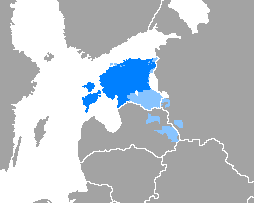
Estonian is a Finnic language, written in the Latin script. It is the official language of Estonia and one of the official languages of the European Union, spoken natively by about 1.1 million people; 922,000 people in Estonia and 160,000 outside Estonia.
Postimees is an Estonian daily newspaper established on 5 June 1857, by Johann Voldemar Jannsen. In 1891, it became the first daily newspaper in Estonia. Its current editor-in-chief is Priit Hõbemägi. The paper has approximately 250 employees.

Otto Wilhelm Masing was an early Baltic German Estophile and a major advocate of peasant rights, especially regarding education.
Estonian literature is literature written in the Estonian language The domination of Estonia after the Northern Crusades, from the 13th century to 1918 by Germany, Sweden, and Russia resulted in few early written literary works in the Estonian language. The oldest records of written Estonian date from the 13th century. Originates Livoniae in Chronicle of Henry of Livonia contains Estonian place names, words and fragments of sentences. The Liber Census Daniae (1241) contains Estonian place and family names. The earliest extant samples of connected Estonian are the so-called Kullamaa prayers dating from 1524 and 1528. The first known printed book is a bilingual German-Estonian translation of the Lutheran catechism by S.Wanradt and J. Koell (1535). For the use of priests an Estonian grammar was printed in German in 1637. The New Testament was translated into southern Estonian in 1686. The two dialects were united by Anton Thor Helle in a form based on northern Estonian. Writings in Estonian became more significant in the 19th century during the Estophile Enlightenment Period (1750–1840).

Jüri Talvet is an Estonian poet and academic. He is the author of various literary works including poetry, criticism, and essays.

Andrus Kivirähk is an Estonian writer, a playwright, topical satirist, and screenwriter. As of 2004, 25,000 copies of his novel Rehepapp ehk November had been sold, making him the most popular 21st century Estonian writer. His book Mees, kes teadis ussisõnu (2007) has been one of the top selling books in Estonia. He has been a member of the Estonian Writers' Union since 1996.

Villem Grünthal-Ridala, born Grünthal-Wilhelm was an Estonian poet, translator, linguist and folklorist.
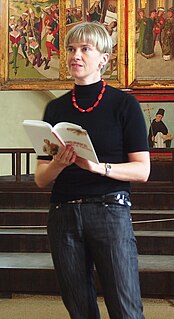
Maarja Kangro is an Estonian poet, short story writer, novelist, essayist, nonfiction writer and librettist.
Pärnu Postimees is an Estonian regional newspaper published in Pärnu County. First published on 5 June 1857, it is one of the oldest papers in the country, and also a forerunner to the national newspaper Postimees.
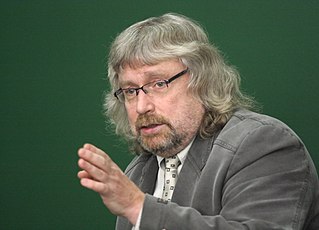
Lauri Vahtre is an Estonian politician, historian, translator and writer.

Olevik was a weekly newspaper published in Tartu, Estonia. The paper existed between 1882 and 1915.
Risto Kübar is an Estonian stage, voice and film actor.
Tiit Lilleorg was an Estonian stage, film and television actor and co-founder and director of the Ida Dance School.
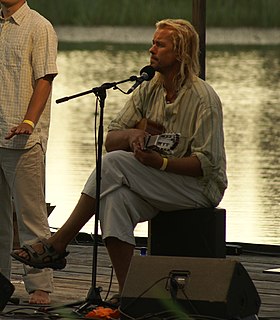
Jaan Tätte is an Estonian playwright, poet, actor, and singer.

Kätlin Kaldmaa is an Estonian freelance writer, poet, translator and literary critic. Since 2010, Kaldmaa is the president of the Estonian PEN. In 2016 she was elected Secretary of the PEN International.
Vallo Kirs is an Estonian stage, film, and television actor and stage director whose career began as a teenager in 2004. Kirs is possibly best recalled internationally for his role as Kaspar in the 2007 Ilmar Raag-directed feature film drama Klass.

Merle Jääger is an Estonian television, stage and film actress, poet and author who frequently uses the pen name Merca. Initially associated with the burgeoning Estonian punk rock scene of the early to mid 1980s, she has been described as the "bard of protest". Her career as an actress began in her early 20s and she has received a number of high-profile awards for stage roles.
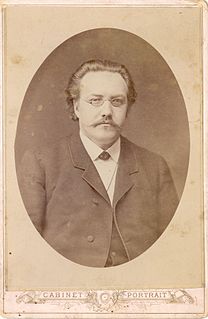
Karl August Hermann was an Estonian writer, publicist, linguist and composer.
Ants Kaljurand was an Estonian anti-Soviet and forest brother during and after World War II.

Haldur Õim is an Estonian linguist.













